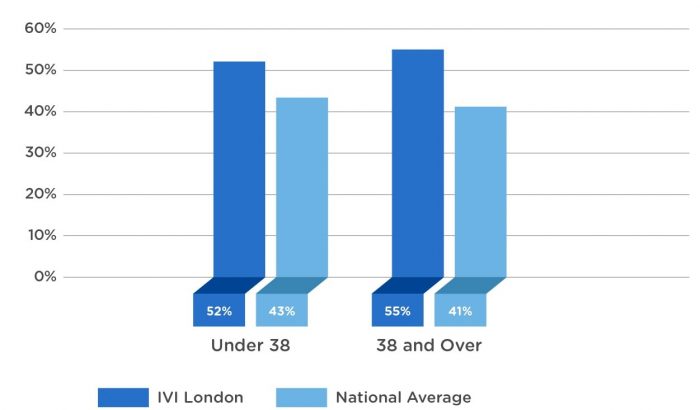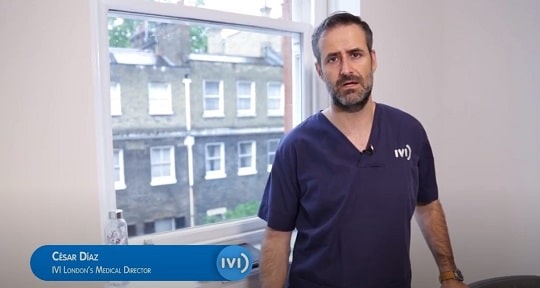IVF and Fertility Treatment After 40
Lots of women and couples choose to have children later in life. In many cases, it may not be until they reach their forties that the time is right to start a family.
For women, the chances of conceiving naturally decrease with age. If you are over 40, the chance of getting pregnant naturally each month is less than 5%. Methods of assisted conception, such as a fertility treatment like IVF, may significantly increase the chances of getting pregnant for those wishing to start a family sooner while minimising the risk of common age-related complications.
IVI provides several treatment options for those starting their fertility journey at 40 or over, including IVF and egg donation programs. We believe that transparency matters and we will always be honest with you about your individual chances of success, so you can make an informed decision about your treatment.
Our specialists are at your disposal to help you build your family safely and effectively. The first step is to schedule an initial consultation where we can review your medical history, calculate your ovarian reserve using a fertility assessment and explore bespoke treatment options based on your results.
The impact of age on fertility
Pre-Implantation Genetic Testing for Aneuploidy (PGT-A)
Women and couples over the age of 40 are often recommended Pre-Implantation Genetic Testing for Aneuploidy (PGT-A) . PGT-A, formerly known as PGS, is a form of embryo screening which is able to detect chromosomal abnormalities in embryos created through IVF.
The natural decline in egg quality with maternal age means there is a much higher risk of chromosomal abnormalities in pregnancy for women over 40. Chromosomal abnormalities , otherwise known as aneuploidies , occur when too many or too few chromosomes are present in an embryo’s genetic material. This can lead to serious developmental problems in addition to genetic disorders, such as Down Syndrome or Turner Syndrome.
Chromosomal abnormalities are the most common cause of implantation failure and miscarriage across women of all ages, but for those trying to conceive over the age of 40, they are far more common and present a more serious health risk for both mother and baby.
Screening embryos using PGT-A allows embryologists to select only the embryos for transfer which are chromosomally normal, with the highest implantation and development potential. Screening an embryo using PGT-A does not harm the embryo.

Success Rates with PGT-A

With PGT-A, IVI London consistently achieves live birth rates per embryo transferred of over 51% for women over 40. This equates to 1 in every 2 embryos transferred resulting in the birth of a healthy baby for women in this age group.
View success ratesPGT-A is classified by the HFEA as a treatment add-on . PGT-A is not recommended for all patients, so it is best to speak to your consultant who can assess your individual situation and help you decide whether this treatment is right for you.
Whether PGT-A is recommended is based on your personal circumstances, such as your medical history. If PGT-A is recommended by your consultant, it will be explained in detail so that you have all the information you need to make an informed decision about your chosen treatment.

Egg Donation

Women who have trouble achieving a pregnancy using their own eggs for age-related reasons can also use donated eggs from a known, or unknown, donor. If you are over 40, a routine fertility assessment can help you and your consultant decide whether donor eggs may be the right option for you.
Find out more
There are a number of reasons you may require egg donation, such as:
- Maternal age: The natural age-based decline in female fertility means that patients over the age of 40 may have a significantly better chance of success using donated eggs.
- Premature or early menopause: Some women enter the menopause prematurely, which causes the ovary to stop producing eggs. It is important to remember that you can still get pregnant with donor eggs if you are postmenopausal.
- Cancer treatment: Common treatments for cancer, such as chemotherapy, can permanently damage the reproductive organs and lead to infertility.
- Ovarian surgery: Certain conditions, such as large or cancerous ovarian cysts, may require surgery in which one or both ovaries are removed, meaning eggs are no longer produced.
- Genetic conditions: Women who are known carriers of serious genetic diseases may need to use donated eggs to avoid passing down the condition to their child.

Male fertility over 40

From the age of 40, men also experience a gradual decline in fertility as sperm quality begins to decrease. Lifestyle choices, such as your weight, fitness level and whether or not you smoke, are also contributing factors to your potential to conceive. If you have concerns about your fertility, you may wish to arrange a semen analysis , or a seminogram.
A semen analysis involves examining a semen sample to assess the health of the sperm. It is the primary test used to establish the sperm count and diagnose semen abnormalities which may be affecting your ability to conceive.

